Product Description
Features of the Top Signal RF Explorer 4G/5G signal meter
- Detects strength and direction of cellular and other LF, MF, HF, VHF, and UHF frequencies with no gaps.
- Works indoors and outdoors.
- Pocket size and lightweight.
- Detects frequencies from 50 KHz to 4000 MHz (4 GHz), including cellular and 2.4 GHz WiFi spectra. (Learn more.)
- Two SMA-female connectors attach to external antennas (included) or to any antenna or cable with SMA-male connectors.
- Solid metal case with high-quality varnished paint.
- 128 × 64 backlit LCD screen with excellent indoor and outdoor visibility.
- Mini-USB 2.0 connector recharges the built-in lithium-ion battery and connects to Windows, macOS, and Linux computers for extra functionality. (Mini-USB cable included; click here
 to download RF Explorer software.)
to download RF Explorer software.)
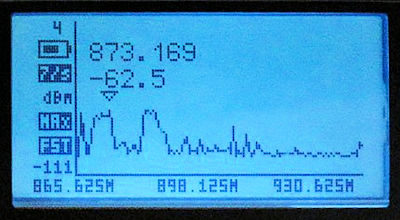 The RF Explorer signal meter’s display
The RF Explorer signal meter’s display
Who is the Top Signal RF Explorer 4G/5G signal meter for?
- The RF Explorer is used by professional installers to detect signal strength and distance when conducting site surveys and installing and troubleshooting in-building cell phone signal booster systems.
Top Signal RF Explorer 4G/5G signal meter contents
 RF Explorer signal meter
RF Explorer signal meter
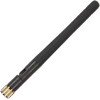 Right-angle 400–900 MHz UHF antenna
Right-angle 400–900 MHz UHF antenna
 2.4 GHz 2 dBi whip dipole antenna
2.4 GHz 2 dBi whip dipole antenna
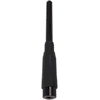 Telescoping dual-band 144/430 MHz antenna
Telescoping dual-band 144/430 MHz antenna
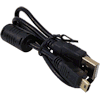 USB-A to micro-USB cable
USB-A to micro-USB cable
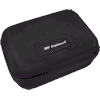 Hard-sided zippered carry case
Hard-sided zippered carry case
Popular frequencies detected by the RF Explorer 4G/5G signal meter
This list includes common, well-known frequencies that can be surveyed with the RF Explorer signal meter. For a complete list of allocated frequencies between 15 MHz and 2700 MHz, please consult this index .
.
26.96–27.41
Citizens band (CB) radio
40
Garage door openers, alarm systems
40–50, 900
Cordless home phones
50–54, 144–148, 216–220, 222–225, 420–450, 902–928, 1240–1300, 2300–2310, 2390–2450
Amateur (ham) radio
54–88, 174–216
VHF television (channels 2–6, 7–13)
108–117.975, 1559–1610
Global Positioning System (GPS)
462.5625–467.7125
Family band radio
470–614
UHF television (channels 14–37)
617–698
Cellular band 71 (Digital Dividend)
699–716, 729–746
Cellular band 12/band 17 (Lower SMH)
746–756, 777–787
Cellular band 13 (Upper SMH)
758–768, 788–798
Cellular band 14 (Upper SMH/FirstNet)
814–849, 859–894
Cellular band 5/band 26 (CLR)
1710–1780, 2110–2200
Cellular band 4/band 66 (AWS)
1850–1915, 1930–1995
Cellular band 2/band 25 (PCS)
2305–2315, 2350–2360
Cellular band 30 (WCS, “WiMax”)
2400–2484
WiFi (802.11b/g/n), Bluetooth, older cordless home phones
2496–2690
Cellular band 41 (BRS/EBS)
3550–3700
Cellular band 48 (CBRS)
3300–5000
Cellular band 48 (CBRS)/band 77 (C-Band)
Product Specifications
Usage:
Commercial installers
Impedance:
50 Ω
Connector Type:
SMA-female (×2)
Frequency Range (Left Connector):
50 KHz–960 MHz
Frequency Range (Right Connector):
240 MHz–4000 MHz
Frequency Span:
2 MHz–960 MHz in a single sweep
Frequency Resolution:
1 kHz
Amplitude Resolution:
0.5 dBm
Dynamic Range:
−125 dBm–10 dBm
Max Input Power (Absolute):
+30 dBm
Average Noise Level (Typical LNA):
−125 dBm
Amplitude Stability & Accuracy (Typical):
±3 dBm
Resolution Bandwidth (RBW):
2.6 kHz–600 kHz (automatic)
Warranty Information
For warranty information on this product, please see our Top Signal warranty information page.
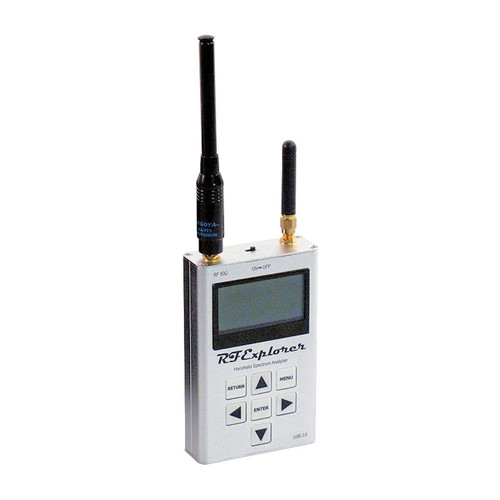

 The RF Explorer signal meter’s display
The RF Explorer signal meter’s display
.